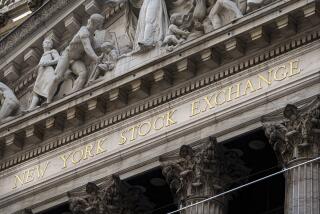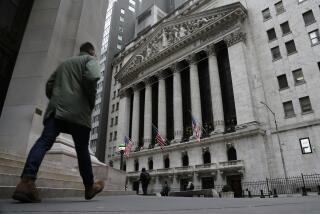Fears bloom of new crisis in financials
All the talk in the credit markets this week is that another big bomb is about to go off in the financial system.
That helped pull the stock market down Tuesday for a second session, led (again) by bank and brokerage stocks.
What kind of financial-system bomb? That’s the problem: The fear is very generic, not specific.
Notably, these jitters intensified last week, even before a weekend article in Barron’s that effectively dug the grave for the common stocks of mortgage financiers Fannie Mae and Freddie Mac. Because their shares crashed on the article, Fannie and Freddie don’t seem to fill the bill as looming market surprises, although they’re adding to the heightened state of concern.
Michael Darda, economist at MKM Partners in Greenwich, Conn., notes that nervous investors have recently demanded higher yields to buy high-quality mortgage-backed bonds and corporate bonds, widening the “spreads” between those yields and Treasury bond yields. “When the spreads widen out, there are stresses brewing” in the system, Darda says. “Previous surges have preceded bank failures or other collapses.” As with the demise of Bear Stearns in March, for example.
Fears of a mega-failure were amplified Tuesday after Kenneth Rogoff, former chief economist at the International Monetary Fund, predicted in a speech in Singapore that a huge U.S. bank was certain to collapse in the near future -- although, of course, he wasn’t naming names.
“The worst is yet to come,” he said, according to the BBC. “We’re not just going to see midsized banks go under in the next few months. We’re going to see a whopper, we’re going to see a big one, one of the big investment banks or big banks.”
Given that kind of good cheer, it’s a wonder the credit markets are functioning at all.
Yet Freddie Mac on Tuesday sold $3 billion in five-year notes, and although the annualized yield of 4.17% was 1.13 points over five-year Treasury note yields -- the widest spread in at least 10 years, according to Bloomberg -- there was enough demand to get the deal done.
The markets’ bad case of nerves may partly stem from memories of what happened a year ago. Just as much of Wall Street was packing up for summer vacation last August, the first major explosions occurred in what was to become the credit crunch.
That should remind us of something: In financial markets, it often works out that you get a crisis when nobody’s expecting one -- not when everybody’s looking for it.
--
On latimes.com
Money & Co.
For what’s moving the financial markets and how it affects your investments, go to
latimes.com/moneyandco.
More to Read
Inside the business of entertainment
The Wide Shot brings you news, analysis and insights on everything from streaming wars to production — and what it all means for the future.
You may occasionally receive promotional content from the Los Angeles Times.










